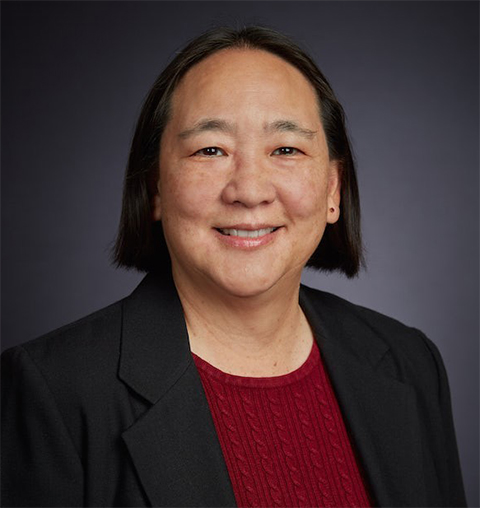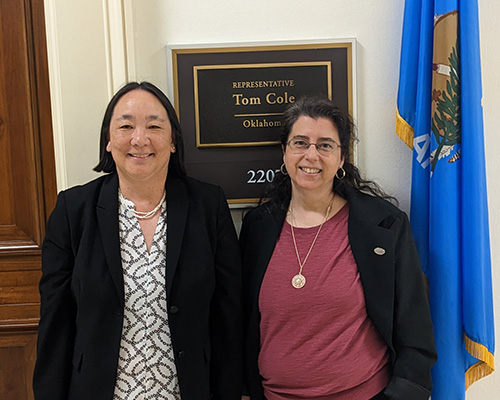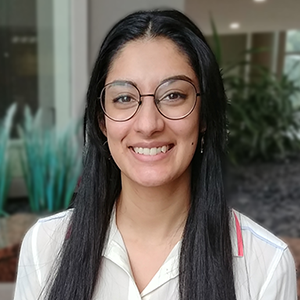
Meet Ann West, leader of the PAAC
Ann West is a professor of chemistry and biochemistry and the associate vice president for research and partnerships at the University of Oklahoma.
She’s also the new chair of the American Society for Biochemistry and Molecular Biology’s Public Affairs Advisory Committee.

ASBMB Today talked to West about her advocacy experience and reasons for getting involved as she embarks on her two-year term.
The interview has been condensed and edited for style and clarity.
What do you think is important for ASBMB members to know about the PAAC?
First, I think that we work very hard in representing the ASBMB.
We have a fantastic 18-member group, some of whom have been recently recruited. We discuss a lot of broad topics, we hear different opinions, and we often can come to a consensus statement that we think best represents the interests of the society. That’s not always an easy thing to do.
I hope that everyone on the PAAC feels like they have a forum for expressing views and for contributing to our public-facing documents, whether it’s a response to an agency call for information or interacting with various funding agencies on issues where we’re able to contribute.
I really hope that our members feel they have a voice and can express their opinions.
Why do you think it’s important for scientists to advocate?
Advocating is so much more important since COVID-19, honestly, because the amount of misinformation and disinformation that we all encountered was really concerning. I think that we owe it to society — in light of the federal funding that we receive — to do our best to communicate that science should be trusted. That’s an important aspect of being on the PAAC: trying to communicate with not just the membership but with the general public.
Did you have any experience with advocating before joining the PAAC?
I was a complete rookie. It was not something that was at the forefront of my mind. However, I am fairly service-minded and want to give back to both my profession and a great society like the ASBMB. So, no, I had no experience to lean on. But once I knew more, then I became interested.
What scared you about policy and advocacy?
I think, inherently, I have an introverted personality. And I was worried it was going to be too public-facing. But, you know, it really has not turned out to be what I feared.
I came to politics, in general, I would say late in life, in part because I didn't become a naturalized citizen until about five years ago. I tended to avoid political discussions or arguments. I didn’t necessarily follow a lot of what was going on in Washington, D.C. I felt like I didn't have that experience or understanding of all the things that go on in our nation's capital.
Now, of course, being a faculty member depends on federal research funding. I did want to know how our lawmakers are involved in making decisions, especially at appropriations time when budgets are being considered. And I was interested in how our federal granting agencies both received funding and allocated funding within agencies such as the National Institutes of Health and the National Science Foundation.
I became more and more and more interested, as a faculty member, because it’s part of our livelihood.

How was your first in-person Capitol Hill Day in May?
I loved the experience. I loved the vibrancy of being in the Capitol Hill area and the bustling hallways of the congressional offices. Growing up in the Northeast, I’d been to Washington, D.C., a number of times but never in the halls of Congress. It was really kind of a thrill.
I was really impressed by the receptiveness of the congressional leaders we met with. I’m not sure that all of our messages were heard, but at least we were able to have a voice. And that was very rewarding.
Any final thoughts to share?
I realized, through the years, that we’re not always training the students in our laboratory to go on to do the same thing that we do. It’s been really great and refreshing to see what the younger generation is looking toward — with a science background but putting it to a different use in the area of science advocacy. If that’s what you're interested in, you should definitely pursue it.
Also, you don't have to make the decision to be an advocate at age 20. You can decide like me, a little bit older, that this is something that I can engage in and give back to a science community that nurtured my career — and hopefully be effective.
“I think that we owe it to society — in light of the federal funding that we receive — to do our best to communicate that science should be trusted.” — Ann West
Enjoy reading ASBMB Today?
Become a member to receive the print edition four times a year and the digital edition monthly.
Learn moreGet the latest from ASBMB Today
Enter your email address, and we’ll send you a weekly email with recent articles, interviews and more.
Latest in People
People highlights or most popular articles

From humble beginnings to unlocking lysosomal secrets
Monther Abu–Remaileh will receive the ASBMB’s 2026 Walter A. Shaw Young Investigator Award in Lipid Research at the ASBMB Annual Meeting, March 7-10 in Washington, D.C.

Chemistry meets biology to thwart parasites
Margaret Phillips will receive the Alice and C. C. Wang Award in Molecular Parasitology at the ASBMB Annual Meeting, March 7-10 in Washington, D.C.

ASBMB announces 2026 JBC/Tabor awardees
The seven awardees are first authors of outstanding papers published in 2025 in the Journal of Biological Chemistry.

Decoding how bacteria flip host’s molecular switches
Kim Orth will receive the Earl and Thressa Stadtman Distinguished Scientists Award at the ASBMB Annual Meeting, March 7–10, just outside of Washington, D.C.

Thiam elected to EMBO
He was recognized during the EMBO Members’ Meeting in Heidelberg, Germany, in October.

The timekeepers of proteostasis
Learn about the cover of the winter 2026 ASBMB Today issue, illustrated by ASBMB member Megan Mitchem.

